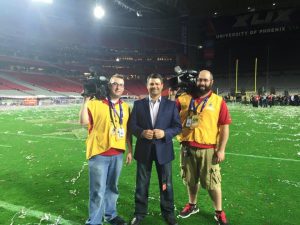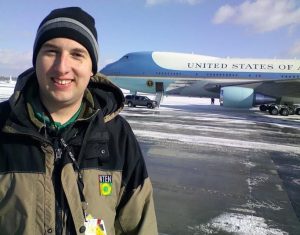
Welcome to our Alumni Series that highlights South Colonie CSD alumni and their life after graduation. The main purpose of the series is to offer in-depth Q&A, storytelling and article features, while keeping you up-to-date on past students, faculty and staff. This week, we are introducing Class of 2003 graduate David Mulligan. Mr. Mulligan has been in the broadcast news industry for nearly 20 years and is currently is a video journalist for NBC Connecticut. During his time in broadcast journalism, he has covered national interest stories ranging from the school shooting at Sandy Hook Elementary and the Boston Marathon bombings to Olympic Games coverage and the Super Bowl. His career continues to take him to meet different people and report on news events around the country.
Beginning his career locally at Capital News 9 (now Spectrum) in 2005, he has continued to use his vision to share stories, perspectives and news features with viewers. Whether it’s local, regional or national news stories, he delivers consistently and creates a narrative for today’s viewer to understand. As he mentions in his Q&A, his visual work must do the following when reporting: provide accuracy, efficiency, and fairness.
Over the past three years, he has begun to focus on long-form investigative/consumer pieces, which includes consumer advocacy stories and some investigative stories that hold people, businesses, and elected officials accountable. To learn more about Mr. Mulligan and his career pathway, view his Q&A below:
How did you get interested in the broadcast industry? How do you view your job in terms of telling a story or providing coverage?

Well, in high school I was taking the TV production course. It was my senior year and I wanted to have some fun after working hard the previous years. I still had not decided what I was going to do with the rest of my life and my guidance counselor, Ms. Mourtray, had told me “Well, you know you can always work in TV for your career. That class is something you seem to really like and excel at and there are a variety of programs available to get you started.” I looked into it a little bit, and here I am.
I think my job is very important, and sometimes challenging, as far as telling a story goes. I tell a story with video and sound. Yes, a lot of times there is someone voicing over or talking on TV presenting it, but the words are only half of the story. I have to take the viewer to a place they have not, or cannot go, with own my camera. Anybody can pull out their phone push record, and capture a video or a picture. It’s how you shoot that video and record the sound, and what you do with what you just shot, that makes a story. Little things like the sound of traffic going past, or birds chirping outside really help the audience get immersed into what is being presented. That is what makes the world of TV different from print. You can actually experience what is going on without being there.
What classes at South Colonie provided you with a spark towards following your pathway?
Definitely the TV production class. When I attended, we would do a live to tape show every week. We would have to go out and shoot our own footage and put together the news stories to air during the broadcast. It was a lot of fun and I learned a lot about the industry. The fact that I took it for college credit made my life easier the following year, because the first ‘Intro to TV’ class I took was exactly what we learned in high school.
In today’s media landscape, how do you view your responsibilities towards providing news/public interest stories etc..?
The world has changed a lot, especially in the last year or two. The rise of social media has really helped fuel the fire and has further divided people from one another, as we become more isolated as a society due to technology and the global pandemic we are currently experiencing. But, the fundamentals of my job really have not changed much since I started. We report what is going on in the community to the community. Accurately, efficiently, and fairly. It is not easy in this political climate to do this job, but people need to know what is going on around them and that is why I get up and go to work every day.
What career advice would I give to students?
Never stop learning and do not cut corners. I think I have said it a few times here, the world keeps changing, especially technology. Whether it is in the broadcasting world or another field, you need to stay up on the latest tech gadgets and software. I started out with a two-way radio in my news car and editing on beta tapes. Now we have smartphones, editing software, and tiny SD cards we shoot with on the size of a quarter. Fifteen years ago, those things did not really exist so imagine what we will have in another fifteen years. As far as cutting corners, that again applies to any job out there. Whatever you do, make sure you get it right the first time. Yes, mistakes will happen, we are all only human, right? But being careless, not doing your due diligence by making sure you have all the right information is not going to serve you well in the end. Be sure to be accurate, even if it means not being first. Also, be the best person you can be every single day.
